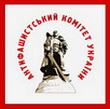History
The organization was established in 2006. [1] It was formed by the former People's Deputy of Ukraine Heorhiy Buiko, who is a secretary [2] of the Central Committee of the Communist Party of Ukraine.
In 2011, they protested in Kyiv against nationalism, alongside the Ukrainian Communist Party and Russian Bloc Party. [3]
On March 3, 2014 the organization supported the annexation of Crimea by the Russian Federation from Ukraine. [4]
On April 18, 2014 the organization accused the acting Government of Ukraine in driving the nation to war, economy down, cutting on salaries and pensions, de facto destruction of education, healthcare, culture and armed forces. [5]
In February 2018, two members of the Committee and of the Communist Party were attacked by Right Sector activists. [6]
In March 2022, the Morning Star reported that two activists in the Committee, Mikhail Kononovich (leader of the Leninist Communist Youth Union of Ukraine, and his brother, Aleksander Kononovich, who had previously been attacked by National Corps/C14 activists, were arrested by the Ukrainian security service, the SBU on charges of “pro-Russian views and pro-Belarusian views"; the Greek Communist Party raised their case in the European Parliament. [7]
This page is based on this
Wikipedia article Text is available under the
CC BY-SA 4.0 license; additional terms may apply.
Images, videos and audio are available under their respective licenses.
